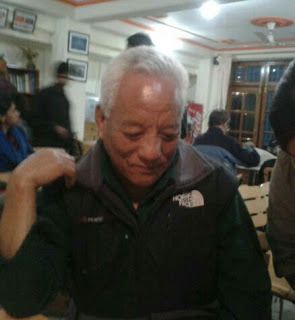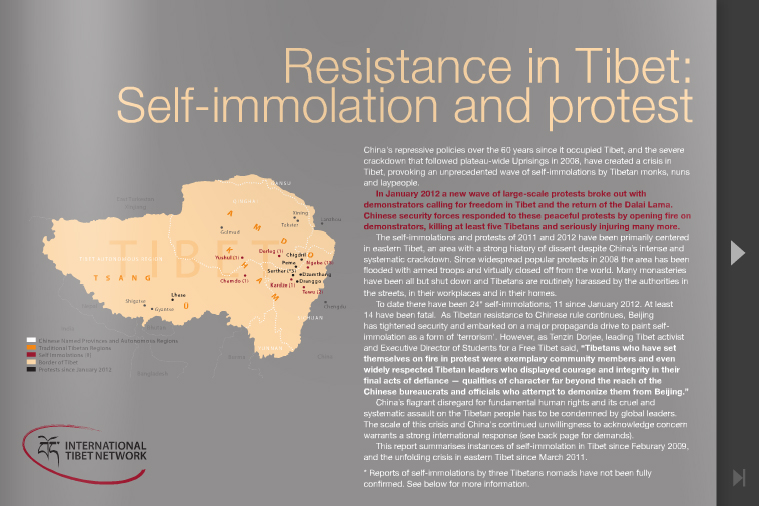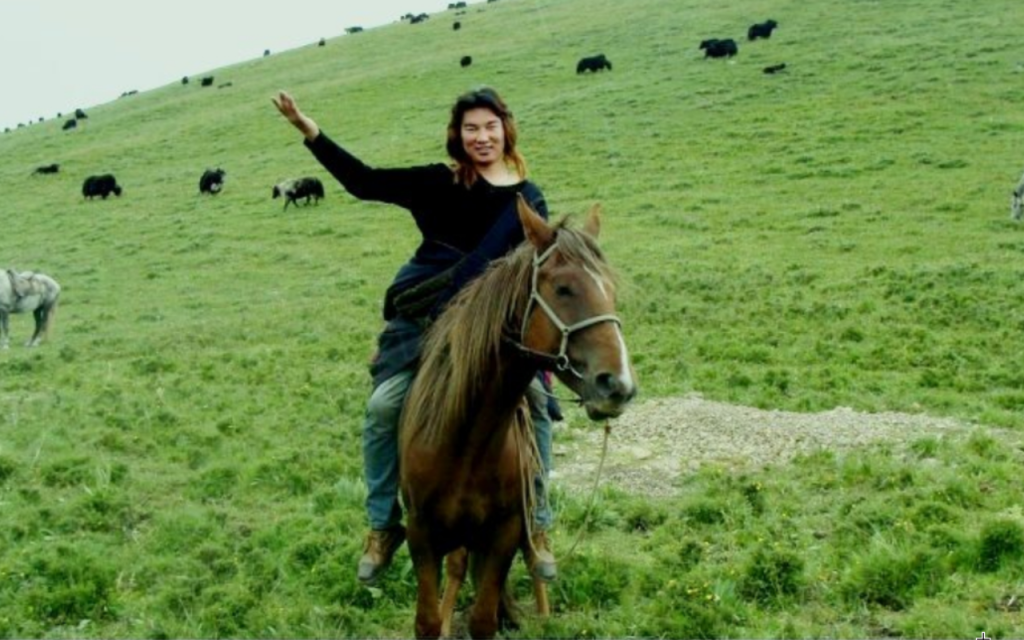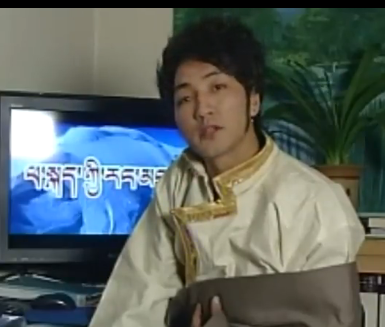[English] | [French] | [Spanish]
ཀ་མད་སུམ་བཅུ།
གཞས་པ། སྐལ་བཟང་བསྟན་འཛིན།
ང་ནི་གངས་རི་ཡི་གངས་ཕྲུག་ཡིན།
ཁྱོད་ནི་ཚྭ་ཐང་ནས་སྐྱེས་པའི་མེ་ཏོག་ཡིན།
ང་ནི་གངས་རི་ཡི་གངས་ཕྲུག་ཡིན།
ཁྱོད་ནི་ཚྭ་ཐང་ནས་སྐྱེས་པའི་མེ་ཏོག་ཡིན།
ཀ་ཁ་ག་ང་། ཅ་ཆ་ཇ་ཉ།
ཏ་ཐ་ད་ན་། པ་ཕ་བ་མ། ཙ་ཚ་ཛ་ཝ།
ཞ་ཟ་འ་ཡ། ར་ལ་ཤ་ས། ཧ་ཨ།
ཨི་ཨུ་ཨེ་ཨོ། སེམས་ལ་ཟུངས།
སློབ། མཁས་མཆོག་ཐོན་མི་སམ་ཊས། རྒྱ་གར་ཡི་གེར་དཔེ་བླངས་ནས།
བོད་ཡིག་འབྲི་བའི་སྲོལ་ཆེན་བཏོད། དབྱངས་བཞི་གསལ་བྱེད་སུམ་བཅུ་དང་།
སྦྱོང་། གསལ་བྱེད་ནང་ནས་རྗེས་འཇུག་བཅུ།
ག་ང་ད་ན་བ་མ་འ། ར་ལ་ས་དང་རྗེས་འཇུག་བཅུ།
ང་ཚོ་ཚང་མ་སེམས་ལ་ཟུངས།
བརྩེ་ལྡན་གྱི་གངས་ཕྲུག་ཚོགས་རྣམས། བོད་རང་ལ་ཁ་དཔེ་ཞིག་ཡོད་དེ།
སྐད་རིགས་ཐམས་ཅད་ཤེས་ན་བཟང་མོད་ཀྱང་།
རང་གི་ཕ་སྐད་བརྗེད་ན་ངོ་ཚ་ཡིན།
བརྩེ་ལྡན་གྱི་གངས་ཕྲུག་ཚོགས་རྣམས། བོད་རང་ལ་ཁ་དཔེ་ཞིག་ཡོད་དེ།
སྐད་རིགས་ཐམས་ཅད་ཤེས་ན་བཟང་མོད་ཀྱང་།
རང་གི་ཕ་སྐད་བརྗེད་ན་ངོ་ཚ་ཡིན།
ཀ་ཁ་ག་ང་། ཅ་ཆ་ཇ་ཉ།
ཏ་ཐ་ད་ན་། པ་ཕ་བ་མ། ཙ་ཚ་ཛ་ཝ།
ཞ་ཟ་འ་ཡ། ར་ལ་ཤ་ས། ཧ་ཨ།
ཨི་ཨུ་ཨེ་ཨོ། སེམས་ལ་ཟུངས།
ང་ནི་གངས་རི་ཡི་གངས་ཕྲུག ཁྱོད་ནི་ཚྭ་ཐང་ནས་སྐྱེས་པའི་མེ་ཏོག
ཚང་མས་ཤེས་རིག་སྦྱོང་ཡ།
བརྩེ་ལྡན་གྱི་གངས་ཕྲུག་ཚོགས་རྣམས། བོད་རང་ལ་ཁ་དཔེ་ཞིག་ཡོད་དེ།
སྐད་རིགས་ཐམས་ཅད་ཤེས་ན་བཟང་མོད་ཀྱང་།
རང་གི་ཕ་སྐད་བརྗེད་ན་ངོ་ཚ་ཡིན།
ང་ནི་གངས་རི་ཡི་གངས་ཕྲུག་ཡིན།
ཁྱོད་ནི་ཚྭ་ཐང་ནས་སྐྱེས་པའི་མེ་ཏོག་ཡིན།
[Top]
Thirty Alphabets
Lyrics: Kalsang Tenzin Composition: Kalsang Tenzin Singer: Kalsang Tenzin
I am a son of land of snows.
You are a blossoming flower from the grassland.
I am a son of land of snows.
You are a blossoming flower from the grassland.
Ka Kha Ga Nga. Ca Cha Ja Nya.
Ta Tha Da Na. Pa Pha Ba Ma. Tsa Tsha Za Wa.
Zha Za A’ Ya. Ra La Sha Sa. Ha Aa.
Ai Au Ae Ao. Memorise them by heart!
Profound Scholar Sambhuta bestowed,
based on the Indian Sanskrit,
the system of Tibetan writing.
Learn the four vowels and the thirty consonants
Ten suffix letters of the consonants: Ga Nga Da Na Ba Ma A’
Ra La Sa are the ten suffix letters.
Let’s all memorise them by hearts!
Dear beloved children of land of snows!
Tibet itself has a saying:
“Although it is good to know other languages,
it is a shame to forget your own.”
Dear beloved children of land of snows!
Tibet itself has a saying:
“Although it is good to know other languages,
it is a shame to forget your own.”
Ka Kha Ga Nga. Ca Cha Ja Nya.
Ta Tha Da Na. Pa Pha Ba Ma. Tsa Tsha Za Wa.
Zha Za A’ Ya. Ra La Sha Sa. Ha Aa.
Ai Au Ae Ao. Memorise them by heart!
I am a son of land of snows.
You are a blossoming flower from the grassland.
Everyone, study!
Dear beloved children of land of snows!
Tibet itself has a saying:
“Although it is good to know other languages,
it is a shame to forget your own.”
(Repeat)
I am a son of land of snows.
You a blossoming flower from the grassland.
(Repeat)
[Top]
[FRENCH]
Les Trente Lettres de L’alphabet
Je suis un fils du pays des neiges.
Tu es une fleur s’épanouissant dans la prairie.
Je suis un fils du pays des neiges.
Tu es une fleur s’épanouissant dans la prairie.
Ka Kha Ga Nga. Ca Cha Ja Nya.
Ta Tha Da Na. Pa Pha Ba Ma. Tsa Tsha Za Wa.
Zha Za A’ Ya. Ra La Sha Sa. Ha Aa.
Ai Au Ae Ao. Apprenez par cœur!
Le grand lettré Sambhota a légué,
à partir du sanskrit indien,
le système d’écriture de la langue tibétaine.
Apprenez les quatre voyelles et les trente consonnes.
Dix lettres suffixes des consonnes:
Ga Nga Da Na Ba Ma A’
Ra La Sa, voilà les dix lettres suffixes.
Apprenons-les toutes par coeur!
Enfants chéris du pays des neiges!
Au Tibet, nous avons un dicton:
“Même s’il convient d’apprendre d’autres langues,
ce serait dommage d’en oublier la sienne.”
Enfants chéris du pays des neiges!
Au Tibet, nous avons un dicton:
“Même s’il convient d’apprendre d’autres langues,
ce serait dommage d’en oublier la sienne.”
Ka Kha Ga Nga. Ca Cha Ja Nya.
Ta Tha Da Na. Pa Pha Ba Ma. Tsa Tsha Za Wa.
Zha Za A’ Ya. Ra La Sha Sa. Ha Aa.
Ai Au Ae Ao. Apprenez par cœur!
Je suis un fils du pays des neiges,
Tu es une fleur s’épanouissant dans la prairie.
A chacun d’étudier!
Enfants chéris du pays des neiges!
Au Tibet, nous avons un dicton:
“Même s’il convient d’apprendre d’autres langues,
ce serait dommage d’en oublier la sienne.”
Je suis un fils du pays des neiges,
Tu es une fleur s’épanouissant dans la prairie.
Je suis un fils du pays des neiges,
Tu es une fleur s’épanouissant dans la prairie.
Je suis un fils du pays des neiges,
Tu es une fleur s’épanouissant dans la prairie.
FRENCH VIDEO: http://vimeo.com/18961695
[Top]
[Spanish]
Kalsang Tenzin
Soy hijo del país de las nieves
Tú eres una flor de las praderas
Yo soy hijo del país de las nieves
Tú eres una flor de las pradera
Ka Kha Ga Nga. Ca Cha Ja Nya.
Ta Tha Da Na. Pa Pha Ba Ma. Tsa Tsha Za Wa.
Zha Za A’ Ya. Ra La Sha Sa. Ha Aa.
Ai Au Ae Ao. ¡Memorizalas bien
Renombrado Académico Sambhuta generó,
el sistema de escritura tibetana,
basado en el Sánscrito Indio.
Aprende las cuatro vocales y las 30 consonantes
Diez sufijos de las consonantes:
Ga Nga Da Na Ba Ma A’
Ra La Sa son los diez sufijos
¡Vamos todos a memorizar bien las letras!
Amados hijos del país de las nieves!
En Tibet existe un dicho:
“Aunque es muy bueno aprender otros idiomas,
(sería una vergüenza olvidar tu propia lengua.”
¡Amados hijos del país de las nieves!
En Tibet existe un dicho:
“Aunque es muy bueno aprender otros idiomas,
sería una vergüenza olvidar tu propia lengua.”
Ka Kha Ga Nga. Ca Cha Ja Nya.
Ta Tha Da Na. Pa Pha Ba Ma. Tsa Tsha Za Wa.
Zha Za A’ Ya. Ra La Sha Sa. Ha Aa.
Ai Au Ae Ao. ¡Memoriza bien las vocales!
Soy hijo del país de las nieves.
Tú eres una flor de las praderas.
¡Todos, estudiemos!
¡Amados hijos del país de las nieves!
En Tibet existe un dicho:
“Aunque es muy bueno aprender otros idiomas,
sería una vergüenza olvidar tu propia lengua.”
¡Amados hijos del país de las nieves!
En Tibet existe un dicho:
“Aunque es muy bueno aprender otros idiomas,
sería una vergüenza olvidar tu propia lengua.”
¡Amados hijos del país de las nieves!
En Tibet existe un dicho:
“Aunque es muy bueno aprender otros idiomas,
sería una vergüenza olvidar tu propia lengua.”
¡Amados hijos del país de las nieves!
En Tibet existe un dicho:
“Aunque es muy bueno aprender otros idiomas,
sería una vergüenza olvidar tu propia lengua.”
Soy hijo del país de las nieves
Tú eres una flor de las praderas
Yo soy hijo del país de las nieves
Tú eres una flor de las praderas
Soy hijo del país de las nieves
Tú eres una flor de las praderas
Spanish Video: http://vimeo.com/19437980
[Top]







